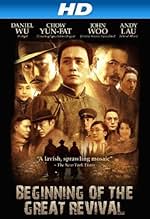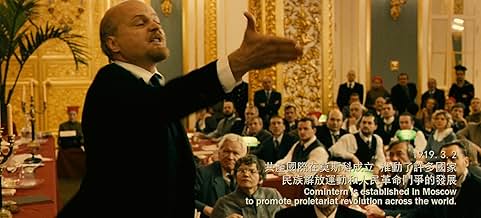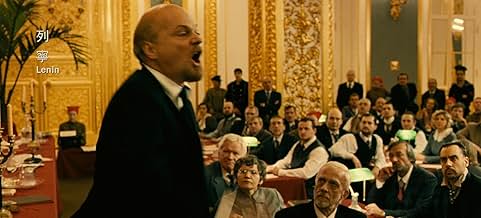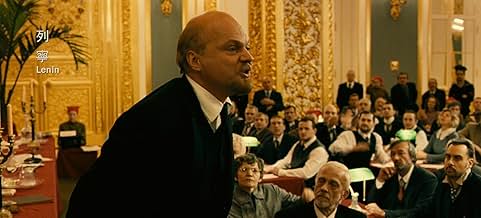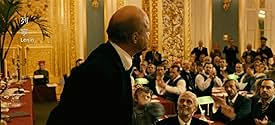IMDb रेटिंग
3.1/10
6.5 हज़ार
आपकी रेटिंग
अपनी भाषा में प्लॉट जोड़ेंA chronicle of the events that led to the founding of the Chinese Communist Party.A chronicle of the events that led to the founding of the Chinese Communist Party.A chronicle of the events that led to the founding of the Chinese Communist Party.
- निर्देशक
- लेखक
- स्टार
- पुरस्कार
- 7 जीत और कुल 5 नामांकन
Tony Ka Fai Leung
- Fan Jingsheng
- (as Tony Leung)
Shengyi Huang
- Female Soldier
- (as Eva Huang)
फ़ीचर्ड समीक्षाएं
The BAD. A prequel to Founding Of A Republic, and merely an another attempt at glorifying The Communist Chinese Party for its part in bring China under one banner.Personally this film would be a peace of garbage if it wasn't for the Chinese Super Stars that starred in this film.
The GOOD I enjoy the action sequence when the First Civil War erupted during the warlord era. But right after that the film was more Politically Motivated at making the CCP,(Chinese Communist Party), look good and bashing others. Jackie Chan's 1911 was more easily enjoyable then this Communist Propaganda film. As soon as I see a name of one of China's worst leaders,(Man responsible for the failed Great Leap Forward), I just knew it was gonna go down hill really bad. In the End the film was good for battle scenes and for it's nostalgic imperial clothing and 1911 post clothing that people wore back then. Other than that, this film was a Communist film all the way.
In 1900's and 1911 and on wards China was a country that had a revolution movement that was a ticking time bomb just waiting to be lit and explode. The Chinese Civil War ended with one victor. The Communist won. And China is the way that is today.
The GOOD I enjoy the action sequence when the First Civil War erupted during the warlord era. But right after that the film was more Politically Motivated at making the CCP,(Chinese Communist Party), look good and bashing others. Jackie Chan's 1911 was more easily enjoyable then this Communist Propaganda film. As soon as I see a name of one of China's worst leaders,(Man responsible for the failed Great Leap Forward), I just knew it was gonna go down hill really bad. In the End the film was good for battle scenes and for it's nostalgic imperial clothing and 1911 post clothing that people wore back then. Other than that, this film was a Communist film all the way.
In 1900's and 1911 and on wards China was a country that had a revolution movement that was a ticking time bomb just waiting to be lit and explode. The Chinese Civil War ended with one victor. The Communist won. And China is the way that is today.
This film starts with the 1911 xinhai revolution and quickly goes over the chaos of the early republic and its trouble with Yuan shi-kai. The May 4th movement is portrayed as the touchstone to the founding of the communist party (certainly a lot of the future leaders of the party started getting involved in politics at this time). This could have been a much longer film covering more in depth coverage of the personalities of this time and still have my interest because of my study of Chinese history. For a general audience this film may have too many characters they know nothing about and find confusing. Even more so if you are not Chinese or a student of this time in history. How many people know about the Japanese occupation of the Shandong peninsula and its impact on Chinese thinking about the west? If you do have some knowledge of the people and time in China during the years covered in this film you will enjoy this movie.
I don't think this movie is intended for non-Chinese, who weren't taught that history (1910-1949) in China. Here is the logic. The Qing Dynasty, a symbol of Feudalism, had already resigned. The Beiyang government was good at selling nation's interest and shooting at students. Sun Yat-sen was too fragile to lead China. KMP was totally corrupted and lead the whole country into disaster. So only CCP could represent Chinese people's interest and lead China. (Don't raise your hands. Recite them and we'll have tests tomorrow.) Such series(foundation of party/government) are just a film version of history books.
On the plane, I looked back at this movie ten years ago. At that time, I went to the cinema just to count the stars. Now I see it again and find that it is really difficult to shoot. It is called "the great cause of the founding of the party", but ambition is to comb through the recordable modern history from the beginning, which is inevitable. However, it is not easy to balance commerciality and dedication. Although the theme of the whole film is unknown and no effective characters have been established, it is indeed the best work to balance the two characteristics mentioned above. In 1921, although the perspective is more concentrated and more "people-friendly", it has lost the opening and closing under the background of the great era and become more "small family spirit". When it comes to 110 years, we might as well follow the idea of the great cause of the founding of the party and make another concentrated attempt, which may have good results.
THE GREAT REVIVAL is a lively retelling of early 20th century China, a tumultuous period where the old ways and the new ways collided and many factions seemed to continually war with each other in a bid for power. It's a complex and sometimes epic-feeling production, so I'm surprised to see it rated so low here on the IMDb.
I suspect the reason is that it's a blatant piece of propaganda, with Mao Zedong portrayed as a crusading hero; the story stops before the later troubles that surrounded his career. Now, I'm not bothered by watching propaganda films; I've seen plenty of North Korean efforts and, let's be honest, America makes their own share of flag-waving guff. Propaganda alone isn't a reason to rate a film down.
THE GREAT REVIVAL isn't a perfect film and anybody trying to keep track of all the main characters will soon be scratching their heads in puzzlement. Still, it's an expansive and expensive-looking production, and it's never boring even if some of the material seems extraneous or glossed over too quickly. The stuff with the students riots is particularly watchable, and spotting all of the familiar faces from Chow Yun-Fat to Daniel Wu, Fan Bingbing, Andy Lau, Simon Yam, and even John Woo, is a delight in itself.
I suspect the reason is that it's a blatant piece of propaganda, with Mao Zedong portrayed as a crusading hero; the story stops before the later troubles that surrounded his career. Now, I'm not bothered by watching propaganda films; I've seen plenty of North Korean efforts and, let's be honest, America makes their own share of flag-waving guff. Propaganda alone isn't a reason to rate a film down.
THE GREAT REVIVAL isn't a perfect film and anybody trying to keep track of all the main characters will soon be scratching their heads in puzzlement. Still, it's an expansive and expensive-looking production, and it's never boring even if some of the material seems extraneous or glossed over too quickly. The stuff with the students riots is particularly watchable, and spotting all of the familiar faces from Chow Yun-Fat to Daniel Wu, Fan Bingbing, Andy Lau, Simon Yam, and even John Woo, is a delight in itself.
क्या आपको पता है
- ट्रिवियाTao Liu's debut.
- साउंडट्रैकOne Day
Written by Chen Tao
टॉप पसंद
रेटिंग देने के लिए साइन-इन करें और वैयक्तिकृत सुझावों के लिए वॉचलिस्ट करें
- How long is Beginning of the Great Revival?Alexa द्वारा संचालित
विवरण
- रिलीज़ की तारीख़
- कंट्री ऑफ़ ओरिजिन
- भाषाएं
- इस रूप में भी जाना जाता है
- Beginning of the Great Revival
- फ़िल्माने की जगहें
- उत्पादन कंपनियां
- IMDbPro पर और कंपनी क्रेडिट देखें
बॉक्स ऑफ़िस
- US और कनाडा में सकल
- $1,51,000
- US और कनाडा में पहले सप्ताह में कुल कमाई
- $65,866
- 26 जून 2011
- दुनिया भर में सकल
- $5,83,20,429
- चलने की अवधि2 घंटे 20 मिनट
- रंग
- ध्वनि मिश्रण
- पक्ष अनुपात
- 2.35 : 1
इस पेज में योगदान दें
किसी बदलाव का सुझाव दें या अनुपलब्ध कॉन्टेंट जोड़ें



